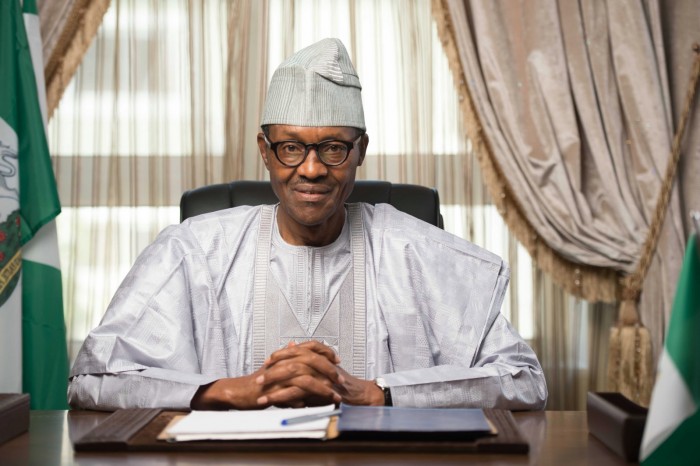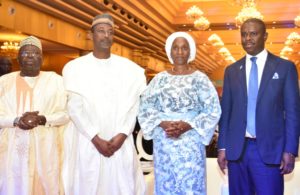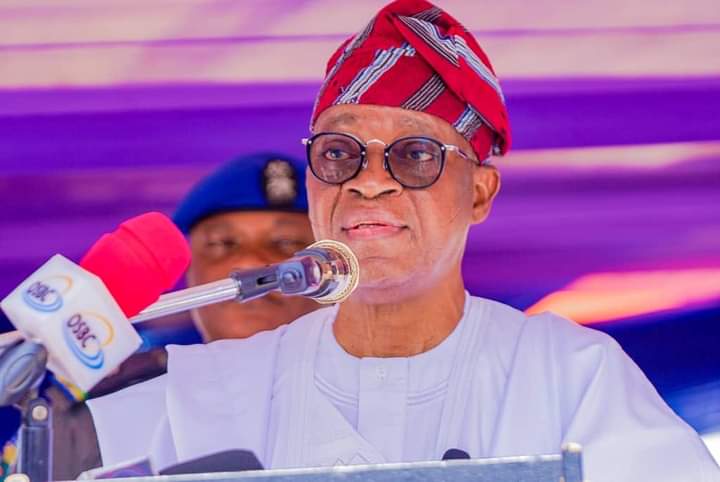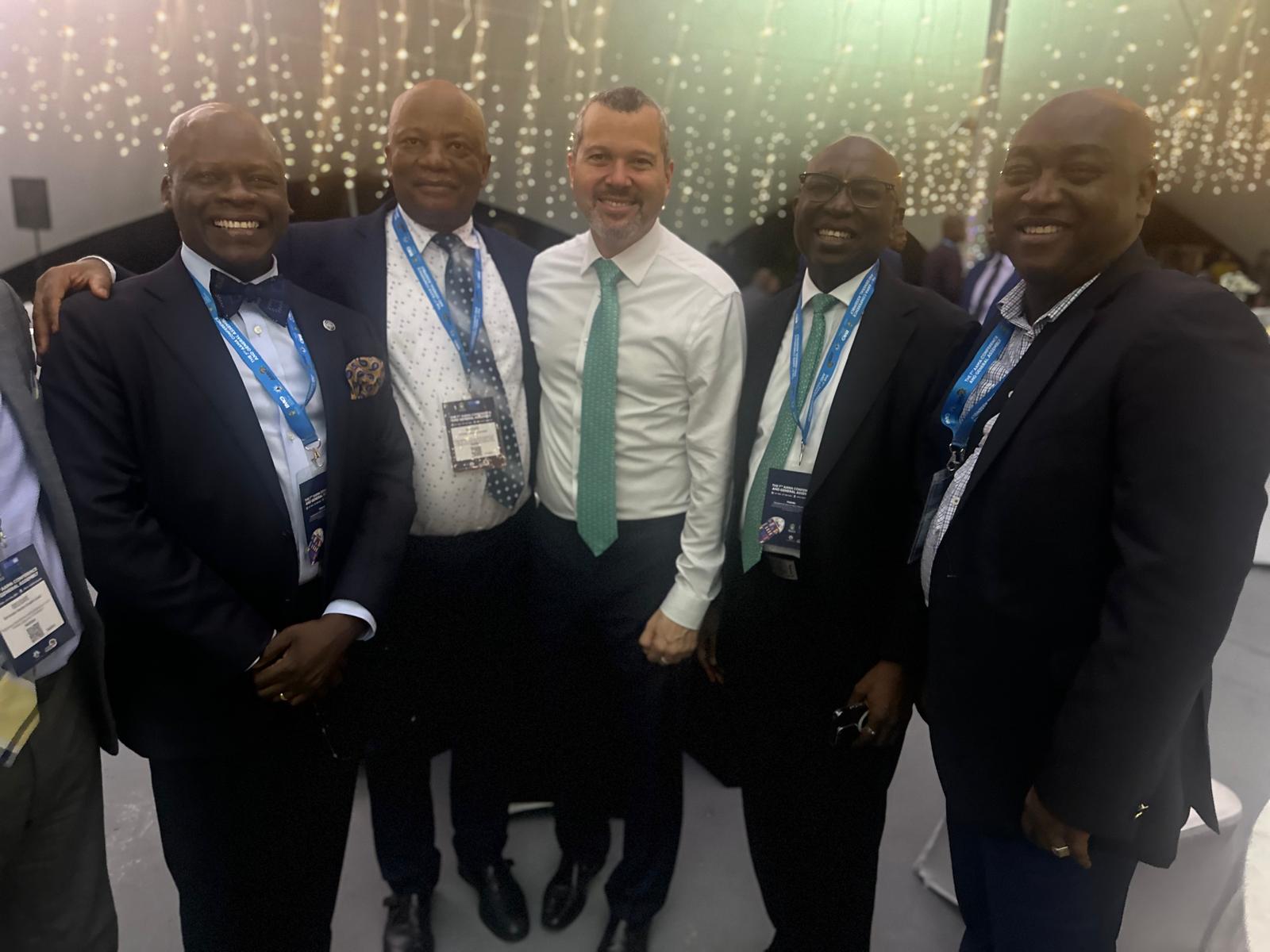Maritime
Gender equality: President Buhari wants more women professionals for economic devt

Modupe ASUDO
THE First Lady of the Federal Republic of Nigeria, Dr. Aisha Buhari, has disclosed that President Muhammadu Buhari is determined to provide platforms that will encourage more women’s participation in maritime to boost economic development. The President’s wife stated this on Tuesday in Lagos at an event to mark the 2019 Day of the Seafarer, with the theme, “On board with gender equality.”
The International Maritime Organisation (IMO) chose the theme, which resonates with its theme for this year’s World Maritime Day, to highlight the contributions of women in the maritime industry and encourage more women to go into the profession of sea transportation.

R-L: Director General, Nigerian Maritime Administration and Safety Agency (NIMASA), Dr. Dakuku Peterside; Wife of the Vice President, Federal Republic of Nigeria, Mrs. Dolapo Osinbajo; Permanent Secretary, Federal Ministry of Transportation, Mr. Sabiu Zakari and NIMASA Board Chairman, General, Jonathan India Garba (Rtd.) during the 2019 celebration of the Day of the Seafarer held in Lagos.
Dr. Buhari said there was need to promote gender balancing in the seafaring career, adding that the President is aware of the economic benefits that come with encouraging the female gender in the maritime sector.
The Director-General of the Nigerian Maritime Administration and Safety Agency (NIMASA), Dr. Dakuku Peterside, spoke in a similar vein, saying the men should support women, especially in maritime, “towards reaching their potential and navigating work place challenges.” This was just as President of the World Maritime University (WMU), Dr. Cleopatra Doumbia-Henry, applauded Nigeria’s effort to encourage more female professionals in the maritime industry.
The First Lady, who was represented by the wife of the Vice President, Mrs. Dolapo Osinbajo, commended NIMASA’s efforts to promote and encourage women in the maritime sector. She noted that such was in line with the President’s aspirations for the sector.
According to her, “Under the current leadership of NIMASA, we have seen significant strides aimed at making women active players in the blue economy industry. Mr. President is desirous of seeing more women play active role in the maritime industry. This celebration focusing on women seafarers is, therefore, apt.”
She called on “all government agencies, especially those in the maritime sector, to ensure the achievement of the United Nations’ Sustainable Development Goal 5, which is aimed at attaining gender equality and the empowerment of all women and girls.”
The NIMASA DG, speaking further, called on men to provide the needed support for women to participate actively in the maritime sector. “We hope to sensitise the industry operators and players on the significance as well as economic importance of bridging gender inequality and the need for men to support women towards reaching their potential and navigating workplace challenges For us to have more women at sea and onshore, the men have a major role to play in terms of providing the needed support.”
He further added that the Agency will continue to pursue policies and programmes that will accelerate gender equality and empowerment of women in the maritime sector. “In addition to the 304 female cadets we have trained in seafaring since the inception of the Nigerian Seafarers Development Programme (NSDP), greater attention will now be given to the training of female seafarers in specialised courses and areas to enable them take up professional responsibilities in specialised vessels and offshore operations, and maritime sector generally,” Dakuku said.
On the New Cabotage Compliance Strategy (NCCS) that suspends waivers on Cabotage manning, Dakuku disclosed that placement of women on board vessels will be given high priority, with greater attention also given to providing an enabling environment for female seafarers. He disclosed that the Agency had already recorded success through the NCCS initiative with about 7,000 Nigerians employed by ship-owners between 2018 and the first quarter of 2019. He said the Agency was doing everything in its powers to resolve the issue of armed robbery and piracy at sea.
In his address, the Permanent Secretary, Federal Ministry of Transportation, Sabiu Zakari, said the Federal Government had initiated policy reviews aimed at promoting gender equality, empowering women in the maritime sector, and creating conducive work environment for them in line with the SDGs.
The WMU President, in his goodwill message to Nigeria on the occasion of the Day of Seafarers, said, “Nigeria is one of our long-standing partners that has provided funds for our fellowships and we want to encourage them to continue. Under the MoU with NIMASA, as well as the support provided by the Nigerian Ports Authority, today, we have 199 WMU alumni from Nigeria, of which 31 are women. About half of these Nigerian female graduates were funded by the government. The rest received funding from other sources and other WMU partners.”
The event was attended by many stakeholders, including Executive Secretary, Nigerian Shippers Council, Alhaji Hassan Bello; Managing Director of the Nigerian Ports Authority (NPA), Ms Hadiza Bala Usman, who was represented by NPA’s Executive Director, Marine and Operations, Dr. Sokonte Davies; Rector, Maritime Academy of Nigeria (MAN), Commodore Duja Effedua; Director, Maritime Safety and Security, Federal Ministry of Transportation, Mr. Danjuma Dauda; and renowned maritime lawyer, Mr. Emeka Akabogu.
Prominent Nigerian women in maritime also graced the occasion. They included Director-General of the Nigerian Chamber of Shipping (NSC), Mrs. Obiageli Obi, and Chairperson, Nigerian Shipownwers Forum, Mrs. Margret Orakwusi, all of who called for more support for the female gender in the maritime career.
In attendance also were members of the NIMASA Governing Board, led by the Chairman, Gen. Jonathan India Garba, and members of the Executive Management.
The Day of the Seafarer is celebrated all over the world on June 25 every year following the resolution adopted by the 2010 diplomatic conference in Manila, Philippines, in line with the International Convention on Standards of Training, Certification and Watchkeeping for Seafarers (STCW Convention).
The International Maritime Organisation (IMO) adopted “On Board with Gender Equality” as the main campaign theme to celebrate the 2019 Day of the Seafarer, which echoes IMO’s theme for the 2019 World Maritime Day, and coincides with the disposition of NIMASA as a gender-sensitive organisation.
It is expected that throughout 2019 there should be a strong emphasis in the maritime space on the importance and value of women within the professional ranks, a campaign driven and targeted at empowering women in the maritime community with the hope of having a strong and far-reaching resonance.
Maritime
Maritime Stakeholders Back Bill For Nigeria Coast Guard At Public Hearing

Stakeholders and experts in Nigeria’s maritime sector have expressed support for the Coast Guard Bill before the National Assembly, with many describing the proposed legislation as a boost to the federal government’s efforts in securing the maritime space.
At a public hearing convened by the Senate Committee on Marine Transport to discuss the bill for the establishment of the Nigeria Coast Guard (NCG), stakeholders presented varying views, with the majority supporting the creation of the NCG.
The majority of presentations voiced strong support for the establishment of the Coast Guard, with notable endorsements from prominent figures including Dr. Olisa Agbakoba, SAN; Dr. Ade Dosunmu, MON, former Director General of NIMASA; Mrs. Jean Anishere, SAN, representing the Nigeria Bar Association; and Rear Admiral Ekwerre U. Ekwerre (Rtd), former Flag Officer Commanding the Training Command of the Nigerian Navy.
ALSO READ: Like America, Like Ghana: Opposition Defeats Ruling Party In Presidential Election
Dr. Olisa Agbakoba described the bill as timely but emphasized the need for professional input to address certain concerns within the draft. He expressed his willingness to assist in this process. Dr. Ade Dosunmu offered full support for the bill, suggesting that the Nigerian Navy should focus on blue-water operations and national defense against external threats, while the Coast Guard should address maritime crimes and incidents along Nigeria’s extensive 855-kilometer coastline using more adaptable resources. He referenced successful maritime nations such as India, Singapore, China, the United States, Japan, Egypt, Morocco, and the United Arab Emirates, all of which have well-defined roles for both the Navy and Coast Guard.
However, Dr. Dosunmu cautioned against assigning functions such as hydrography and oceanographic research to the Coast Guard, as these responsibilities are already managed by other agencies, and incorporating them could divert focus from the Coast Guard’s primary mission.
Jean Anishere, SAN, articulated her support for the bill while highlighting certain ambiguities that must be resolved before it can be enacted. She pointed out specific provisions in the bill that require clarification and further refinement.
Retired Rear Admiral Ekwerre U. Ekwerre addressed concerns raised by the Nigerian Navy and advocated that the Navy should concentrate on defense, showcasing military strength, and conducting diplomatic operations within territorial waters and the Exclusive Economic Zone (EEZ). He asserted that the Coast Guard should be responsible for enforcing maritime laws in the nation’s inland waters.
In summary, while the majority of stakeholders endorsed the establishment of the Nigeria Coast Guard, they also called for careful consideration of the bill’s provisions to ensure clarity and effectiveness in its implementation.
Maritime
How Innovative Financing Would Aid Africa’s Maritime Sector – NIMASA DG

Innovative financing models have been identified as the vital catalyst for achieving sustainable development in the African Maritime industry.
The Director General of the Nigerian Maritime Administration and Safety Agency (NIMASA), Dr. Dayo Mobereola, made the declaration at the 7th Association of African Maritime Administrations (AAMA) conference in Dar es Salaam, Tanzania.
He assured attendees of Nigeria’s commitment to advancing a future where Africa’s maritime sector thrives sustainably.
In his words, “Nigeria is committed to collaborating on technology and innovation to enhance safety, security, decarbonization, and the marine environment for a sustainable future.”
According to him, the conference presents a pivotal opportunity to address our shared challenges, particularly those related to sustainable energy, regional security, and economic growth.
ALSO READ: Tinubu, Ramphosa Co-Chair Bi-National Commission’s 11th Session
“We are here to advocate for innovative financing models and international support that will facilitate sustainable growth. As Nigeria pursues infrastructure development and digital transformation within our maritime sector, we call on our regional and international partners to support these efforts through technical and financial backing.
“Our priorities at the AAMA conference include exploring collaborative avenues to enhance maritime safety and security. By reinforcing our adherence to frameworks like the Djibouti and Yaoundé Codes of Conduct, we aim to solidify Nigeria’s role in combating piracy and maritime crime across West Africa,” he stated.
The AAMA was established to lay a firm foundation for regular consultations, enabling African maritime administrations to build joint positions on issues of common concern in the maritime sector.
When Nigeria hosted the 3rd AAMA conference in 2017, a master plan was developed outlining the measures necessary to advance the maritime agenda as envisioned in the African Maritime Transport Charter. The Association has also created a platform to strengthen cooperation at the regional, continental, and international levels, harmonizing policies and goals essential for the growth of the African maritime sector.
Maritime
Oyetola Counts On Nat’l Marine and Blue Economy Policy To Chart New Course For Dev’t

The Honourable Minister of Marine and Blue Economy, Adegboyega Oyetola is of the view that a National Policy on Marine and Blue Economy is essential for the development of the Nigerian maritime sector.
Biztellers reports that Oyetola shared the view, on Tuesday, while declaring open a stakeholders’ validation session aimed at developing the National Policy on Marine and Blue Economy in Nigeria, in Lagos.
The former Osun State Governor emphasized that the National Policy will create a sustainable pathway for economic growth in fisheries, aquaculture, renewable energy, tourism, and seabed mining, while also ensuring environmental sustainability.
He further noted the need for a robust National Policy to address challenges in the sector, including environmental degradation and illegal activities such as Illegal, Unreported, and Unregulated (IUU) fishing.
ALSO READ: Obi Congratulates NNPC Ltd On Port Harcourt Refinery
In his words, “A robust National Policy will ensure that we address these issues through a comprehensive framework that aligns with international best practices while safeguarding our marine resources for future generations.
“It is worth noting that Nigeria has achieved notable progress in maritime governance, including the ratification and domestication of international protocols and conventions. These measures have strengthened our safety and security framework, resulting in a remarkable three-year period with zero incidents of piracy in our waters. Nonetheless, the recurring boat mishaps underscore the pressing need for immediate action.
“This policy seeks to implement comprehensive strategies to ensure the safety of all waterways. However, challenges such as the recent spate of boat mishaps demand urgent attention. Consequently, this policy aims to establish comprehensive measures that will enhance safety across our waterways.
“As we develop this policy, the Ministry remains committed to repositioning Nigeria as a dominant player in the marine and blue economy, both regionally and globally. We are also pursuing Nigeria’s candidacy for election to Category C of the International Maritime Organization (IMO), which underscores our determination to strengthen our voice in global maritime governance”.
In his welcome address, the Permanent Secretary of the Ministry, Olufemi Oloruntola, noted that the validation workshop is a key step in shaping the National Policy on Marine and Blue Economy — a framework designed to address Nigeria’s specific needs and aspirations while embracing sustainable development principles. “It provides an opportunity for stakeholders to review, refine, and enrich the draft policy through a participatory and inclusive approach,” he said.
The draft policy, which consists of nine parts, offers an elaborate overview of our country’s marine and blue economic endowments and their current state. It affirms our mandate, vision, and mission, setting the stage for the policy’s objectives and aspirations. It further dissects these aspirations into five broad parts of legal and institutional framework; maritime transport, trade and shipping; fisheries and aquaculture; marine abiotic resources; and marine innovation and technology. It also identifies a range of cross-cutting issues and concludes with an assessment of stakeholders to support the implementation structure. Overall, it is a comprehensive document.
Also present at the event were the Chief Executive Officers of all the agencies under the Ministry, including Dr. Dayo Mobereola, Director General, Nigerian Maritime Administration and Safety Agency; Abubakar Dantsoho, Managing Director, Nigerian Ports Authority; Barrister Akutah Pius, Executive Secretary, Nigerian Shippers Council; and Bola Oyebamiji, Managing Director, National Inland Waterways Authority.
Other attendees included Funmi Folorunsho, President, African Shipowners Association; Engr. Greg Ogbeifun, Managing Director, Starz Marine; and the President, National Association of Stevedoring Companies, among other stakeholders.













